新八年级上册英语重点单词讲解
- 格式:pdf
- 大小:6.40 KB
- 文档页数:2
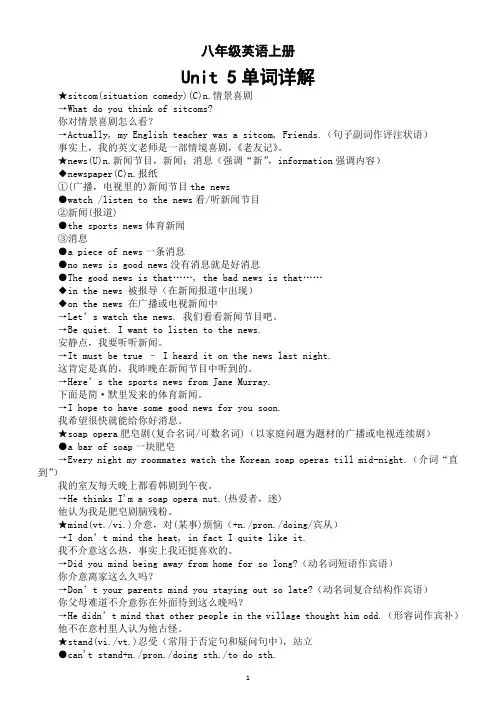
八年级英语上册Unit 5单词详解★sitcom(situation comedy)(C)n.情景喜剧→What do you think of sitcoms?你对情景喜剧怎么看?→Actually, my English teacher was a sitcom, Friends.(句子副词作评注状语)事实上,我的英文老师是一部情境喜剧,《老友记》。
★news(U)n.新闻节目,新闻;消息(强调“新”,information强调内容)◆newspaper(C)n.报纸①(广播,电视里的)新闻节目the news●watch /listen to the news看/听新闻节目②新闻(报道)●the sports news体育新闻③消息●a piece of news一条消息●no news is good news没有消息就是好消息●The good news is that……, the bad news is that……◆in the news 被报导(在新闻报道中出现)◆on the news 在广播或电视新闻中→Let’s watch the news. 我们看看新闻节目吧。
→Be quiet. I want to listen to the news.安静点,我要听听新闻。
→It must be true – I heard it on the news last night.这肯定是真的,我昨晚在新闻节目中听到的。
→Here’s the sports news from Jane Murray.下面是简·默里发来的体育新闻。
→I hope to have some good news for you soon.我希望很快就能给你好消息。
★soap opera肥皂剧(复合名词/可数名词)(以家庭问题为题材的广播或电视连续剧)●a bar of soap一块肥皂→Every night my roommates watch the Korean soap operas till mid-night.(介词“直到”)我的室友每天晚上都看韩剧到午夜。
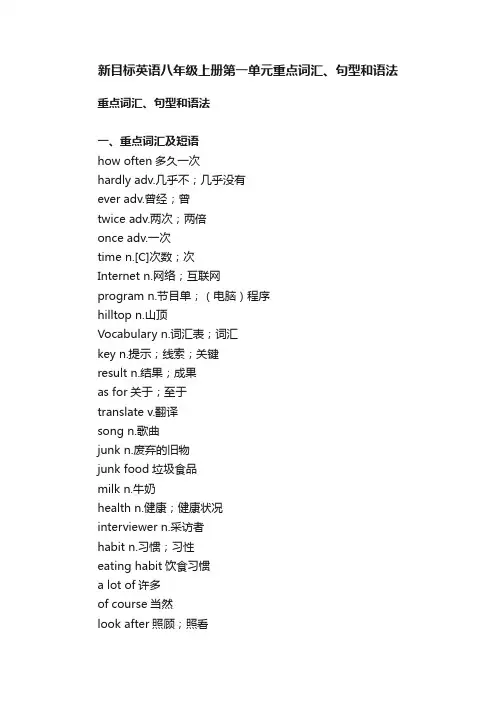
新目标英语八年级上册第一单元重点词汇、句型和语法重点词汇、句型和语法一、重点词汇及短语how often多久一次hardly adv.几乎不;几乎没有ever adv.曾经;曾twice adv.两次;两倍once adv.一次time n.[C]次数;次Internet n.网络;互联网program n.节目单;(电脑)程序hilltop n.山顶Vocabulary n.词汇表;词汇key n.提示;线索;关键result n.结果;成果as for关于;至于translate v.翻译song n.歌曲junk n.废弃的旧物junk food垃圾食品milk n.牛奶health n.健康;健康状况interviewer n.采访者habit n.习惯;习性eating habit饮食习惯a lot of许多of course当然look after照顾;照看difference n.不同;差异;区别make a difference使得结果不同;有重要性grade n.分数;年级;成绩unhealthy adj.不健康的;不益健康的yuck int.(表示反感、厌恶等)although=though conj.虽然;即使;纵然do表强调(位于实义动词前)skateboarding n.滑雪板运动start with以……开始二、重点句型和交际用语1.How often do you…?2.What do you usually do on weekends? I usually play soccer.What do they do on weekends? They often go to the movies.What does he do on weekends? He sometimes watches TV.How often do you shop? I shop once a month.How often does Chung watch TV? He watches TV twice a week.三、重要语法一般现在时的陈述句、特殊疑问句及其回答1.Some students do homework three or four times a week.2.A:How often do you watch TV?B:Twice a week.3.A:What does she do on weekends?B:She often goes to the movies.。
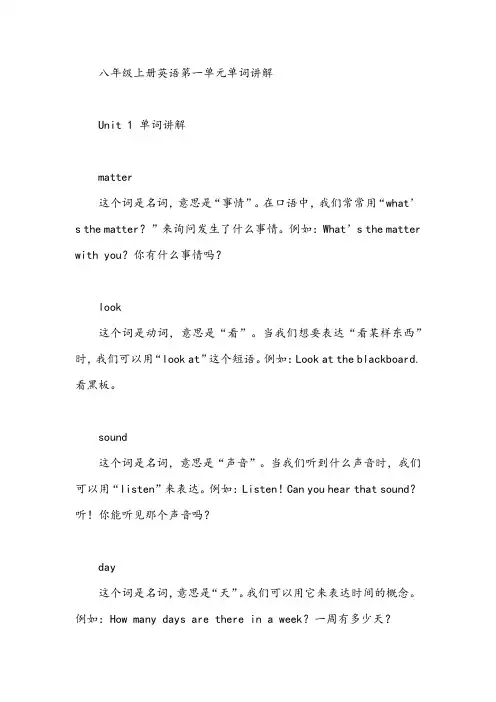
八年级上册英语第一单元单词讲解Unit 1 单词讲解matter这个词是名词,意思是“事情”。
在口语中,我们常常用“what’s the matter?”来询问发生了什么事情。
例如:What’s the matter with you?你有什么事情吗?look这个词是动词,意思是“看”。
当我们想要表达“看某样东西”时,我们可以用“look at”这个短语。
例如:Look at the blackboard.看黑板。
sound这个词是名词,意思是“声音”。
当我们听到什么声音时,我们可以用“listen”来表达。
例如:Listen!Can you hear that sound?听!你能听见那个声音吗?day这个词是名词,意思是“天”。
我们可以用它来表达时间的概念。
例如:How many days are there in a week?一周有多少天?also这个词是副词,意思是“也”。
当我们想要表达“也”的概念时,我们可以用这个词。
例如:I also like English.我也很喜欢英语。
call这个词是动词,意思是“叫做”。
当我们想要表达“把某样东西叫做某名称”时,我们可以用“call”这个短语。
例如:We call it a name.我们把它叫做一个名字。
time这个词是名词,意思是“时间”。
我们可以用它来表示时间的概念。
例如:What time is it now?现在几点了?think这个词是动词,意思是“想”。
当我们想要表达“思考某件事情”时,我们可以用“think about”这个短语。
例如:I think about my homework all day.我想了一整天我的家庭作业。
want这个词是动词,意思是“想要”。
当我们想要表达“想要某件事情发生”时,我们可以用“want to do”这个短语。
例如:I want togo to school.我想去上学。
give这个词是动词,意思是“给”。
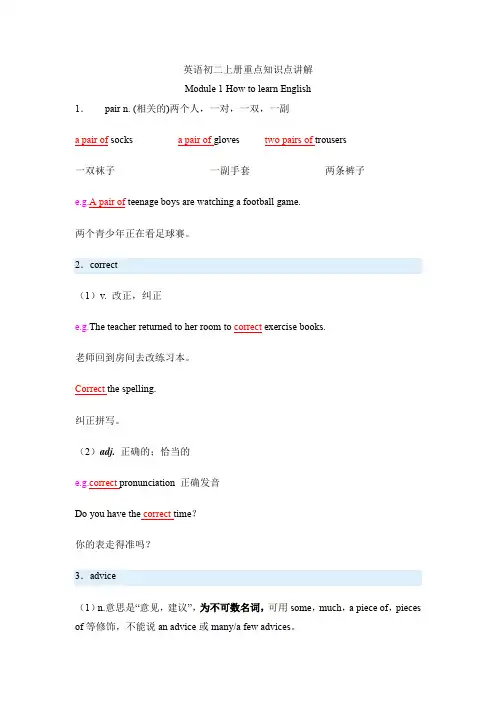
英语初二上册重点知识点讲解Module 1 How to learn English1.pair n. (相关的)两个人,一对,一双,一副a pair of socks a pair of gloves two pairs of trousers一双袜子一副手套两条裤子e.g.A pair of teenage boys are watching a football game.两个青少年正在看足球赛。
2.correct(1)v. 改正,纠正e.g.The teacher returned to her room to correct exercise books.老师回到房间去改练习本。
Correct the spelling.纠正拼写。
(2)adj.正确的;恰当的e.g.correct pronunciation 正确发音Do you have the correct time?你的表走得准吗?3.advice(1)n.意思是“意见,建议”,为不可数名词,可用some,much,a piece of,pieces of等修饰,不能说an advice或many/a few advices。
(2)表示“有关……的建议”时,用介词on,接名词、代词或由疑问词引导的不定式。
e.g.Let’s ask for his advice on what to do next.我们去征求一下他的意见下一步该怎么办。
常见搭配:take/follow one’s advice接受某人的建议ask for advice 征求意见accept/refuse one’s advice接受(拒绝)某人的建议offer advice to sb. 向某人提供建议拓展:advise vt.建议常见搭配:advise sb. to do sth.advise that sb. (should) do sth.e.g.My teacher advises me to leave now.老师建议我现在就离开。

八年级上册重点英语单词 八年级上册重点英语单词 许多国际场合都使用英语做为沟通媒介。在经济全球化的时代,掌握好英语会让自己更具有优势。如下是八年级上册英语单词表,希望能帮到在英语学习路上的你们。 八年级上册重点英语单词1 housework ['haswk] n.家务劳动 hardly ['hɑdli] adv.几乎不;简直不;刚刚 ever ['ev(r)] adv.曾经;在任何时候 once [wns] adv.一次;曾经 twice [twas] adv.两倍;两次 Internet ['ntnet] n.因特网 program ['prɡrm] n.节目;程序;课程;节目单 full [fl] adj.满的;充满的;完全的 swing [sw] n.摇摆;秋千v.摇摆;旋转 maybe ['mebi] adv.或许;也许;可能 swing dance摇摆舞 least [list] adj.最小的;最少的 at least至少 hardly ever很少;几乎从不;难得 junk n.垃圾;废旧杂物 coffee ['kfi] n.咖啡;咖啡色 health [helθ] n.健康;人的身体或精神状态 result [r'zlt] .结果;后果 percent [p'sent] adj.百分之...的 online [n'lan] adj.在线的adv.在线地 television ['telvn] n.电视机;电视节目 although [l'] conj.虽然;尽管;然而;可是 through [θru] prep.穿过;凭借;一直到 body ['bdi] n.身体 mind [mand] .头脑;想法;意见;心思 such [st] adj.这样的;如此的 together [t'ɡe(r)] adv.共同;一起 die [da] v.死;枯竭;消失 writer ['rat(r)] n.作者;作家 dentist ['dentst] n.牙科医生 magazine ['mɡzin] n.杂志 however [ha'ev(r)] adv.然而;无论如何;不管多么 than [n] conj.比 almost ['lmst] adv.几乎;差不多 none [nn] pron.没有人;没有任何东西,毫无 less [les] adj.更少的;较少的 point [pnt] n.看法;要点;重点;小数点;目标;分数 such as例如;诸如 junk food n.垃圾食品;无营养食品 more than超过;多于;不仅仅;非常 less than不到;少于 八年级上册重点英语单词2 close [kls] v.关;合拢;不开放;停业 worst [wst] adj.最坏的;最差的 cheaply ['tipli] adv.廉价地;粗俗地 song [s] n.歌曲;歌唱 choose [tuz] v.选择;决定 carefully ['kefli] adv.小心地,认真地 reporter [r'pt(r)] n.记者 service ['svs] n.服务 pretty ['prti] adv.相当地adj.漂亮的 menu ['menju] n.菜单 act [kt] v.行动;表演 meal [mil] n.一餐;膳食 fresh [fre] adj.新鲜的;清新的 comfortably ['kmftbli] adv.舒服地;容易地;充裕地 worse [ws] adj.更坏的;更差的 theater ['θt] n.剧场;电影院;戏院 comfortable ['kmftbl] adj.舒适的;充裕的 seat [sit] n.座位; screen [skrin] n.屏幕;银幕 so far到目前为止;迄今为止 no problem没什么;不客气 creative [kri'etv] adj.创造的,创造性的; performer [p'fm(r)] n.表演者;执行者 talent ['tlnt] n.天赋;才能,才艺; common ['kmn] adj.常见的;共同的;普通的 magician [m'dn] n.魔术师;术士 beautifully ['bjutfli] adv.美丽地;完美地; role [rl] n.作用;角色 winner ['wn(r)] n.获胜者 prize [praz] n.奖品;奖金 everybody ['evribdi] pron.每人;人人 example [ɡ'zɑmpl] n.例子;榜样 poor [p(r)] adj.可怜的.;贫穷的 seriously ['srisli] 严重地,严肃地 give [ɡv] v.给;赠予;送 crowded ['kradd] adj.拥挤的 have…in common有相同特征 all kinds of各种各样;各种类型 be up to是…….的职责;由…….决定 play a role发挥作用;有影响 makeup编造 for example例如 take…seriously认真对待 八年级上册重点英语单词3 sitcom ['stkm] n.情景喜剧 (= situation comedy) news [njuz] n.新闻;消息 soap [sp] n.肥皂;肥皂剧 educational [edu'kenl] adj.教育的;有教育意义的 plan [pln] n.计划;方法v.打算;计划 joke [dk] n.笑话;玩笑v.说笑话;开玩笑 comedy ['kmdi] n.喜剧;滑稽;幽默事件 find out查明、弄清 meaningless ['minls] adj.无意义的;不重要的 action ['kn] n.行为;活动 cartoon [kɑ'tun] n.卡通;漫画 culture ['klt(r)] n.栽培;文化;教养 famous ['fems] adj.著名的;有名的 appear ['p(r)] vi.出现;出版;显得 hope [hp] .希望;期望;盼望n.希望 discussion [d'skn] n.讨论;谈论 stand [stnd] v.站立;忍受 happen ['hpn] vi.发生;碰巧;出现;偶遇 may [me] aux.可以,能够;可能,也许 expect [k'spekt] v.预期;期待;盼望 become [b'km] v.变成;成为 rich [rt] adj.富有的;富饶的;丰富的 successful [sk'sesfl] adj.成功的;圆满的 might [mat] aux.可能;也许;may的过去式 main [men] adj.主要的;最重要的 reason ['rizn] n.原因;理由 film [flm] n.电影 unlucky [n'lki] adj.倒霉的;不幸的;不吉利的 lose [luz] vt.丢失;失败vi.失败 ready ['redi] adj.准备好的;乐意的 character ['krkt(r)] n.个性;品质;人物; simple ['smpl] adj.简单的;朴素的;单纯的;笨的 army ['ɑmi] n.军队;陆军;一大批 action movie动作片 be ready to愿意迅速做某事 dress up装扮;乔装打扮 take sb.’s place代替;替换 do a good job工作干得好;做得好 八年级上册重点英语单词4 paper[pepr]纸 pollution [plun]污染;污染物 prediction[prdkn]预测future [fjutr]未来 pollute[plut]污染 environment [nvarnmnt]环境 planet [plnt]行星 earth[rθ] n.地球;泥土 plant [plnt],part [pɑrt]参加,部分 peace [pis]和平sky[ska]天空 play a part参与 astronaut[strnt]宇航员 apartment[pɑrtmnt]公寓房间 rocket [rɑkt]火箭; space[spes] .空间;太空 even[ivn]甚至;愈加 human [hjumn]人的; n.人;人类 servant[srvnt]仆人 dangerous [dendrs]危险的 already[lredi]已经factory[fktri]工厂 believe [bliv]相信 disagree [dsɡri]不同意 shape [ep]形状fall [fl]倒塌;跌倒 possible [pɑsbl]可能的 probably [prɑbbli]大概;或许;很可能 holiday [hɑlde]假日word [wrd]单词; space station太空站 over and over again多次;反复地 hundreds of许多;大量;成百上千 fall down突然倒下;跌倒;倒塌 look for寻找;寻求 【八年级上册重点英语单词】
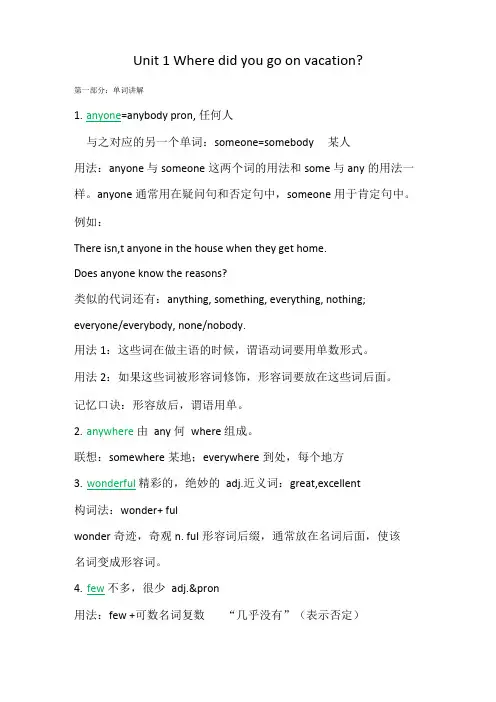
Unit 1 Where did you go on vacation?第一部分:单词讲解1.anyone=anybody pron, 任何人与之对应的另一个单词:someone=somebody 某人用法:anyone 与someone这两个词的用法和some 与any的用法一样。
anyone通常用在疑问句和否定句中,someone用于肯定句中。
例如:There isn,t anyone in the house when they get home.Does anyone know the reasons?类似的代词还有:anything, something, everything, nothing; everyone/everybody, none/nobody.用法1:这些词在做主语的时候,谓语动词要用单数形式。
用法2:如果这些词被形容词修饰,形容词要放在这些词后面。
记忆口诀:形容放后,谓语用单。
2.anywhere 由any 何where 组成。
联想:somewhere某地;everywhere到处,每个地方3.wonderful 精彩的,绝妙的adj.近义词:great,excellent构词法:wonder+ fulwonder奇迹,奇观n. ful形容词后缀,通常放在名词后面,使该名词变成形容词。
4.few 不多,很少adj.&pron用法:few +可数名词复数“几乎没有”(表示否定)a few+可数名词复数“有一些”(表示肯定)拓展:little & a littlelittle+不可数名词“几乎没有”(表示否定)A little+不可数名词“有一些”(表示肯定)记忆口诀:带a表肯定,无a表否定,few是可数的,little不可数例句:(1)She is very shy,and she has few friends.(2)There is little milk left,let’s go and buy some.5.most大多数的adj.用法:most of the+名词=most+名词例如:most of the students=most students6.myself 我自己yourself 你自己以self结尾的单词,称为“反身代词”。
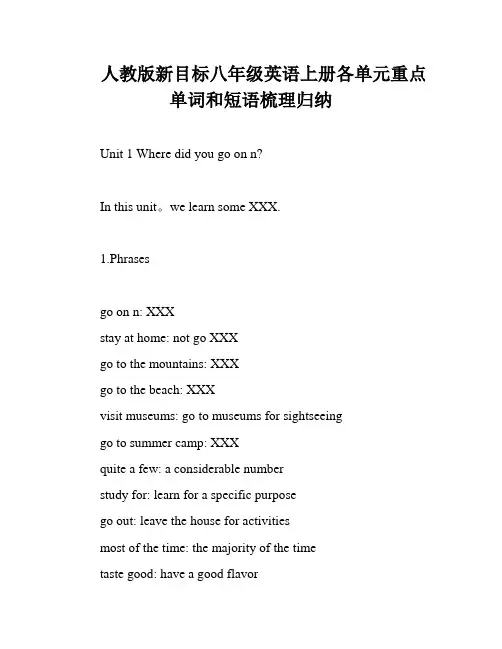
人教版新目标八年级英语上册各单元重点单词和短语梳理归纳Unit 1 Where did you go on n?In this unit。
we learn some XXX.1.Phrasesgo on n: XXXstay at home: not go XXXgo to the mountains: XXXgo to the beach: XXXvisit museums: go to museums for sightseeinggo to summer camp: XXXquite a few: a considerable numberstudy for: learn for a specific purposego out: leave the house for activitiesmost of the time: the majority of the timetaste good: have a good flavorhave a good time: enjoy oneselfof course: certainlyfeel like: have the feeling ofgo shopping: visit stores for shoppingin the past: before nowwalk around: stroll in an areabecause of: due toXXX: a serving ofthe next day: the following dayXXX: have tea as a XXXfind out: discovergo on: continuetake photos: use a camera to capture images XXXup and down: moving in different ns come up: appear or XXX2.Sentence Structuresbuy sth。
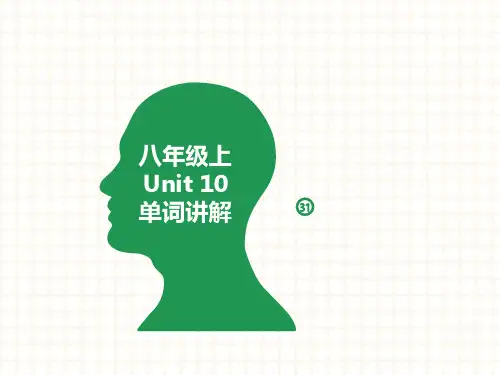
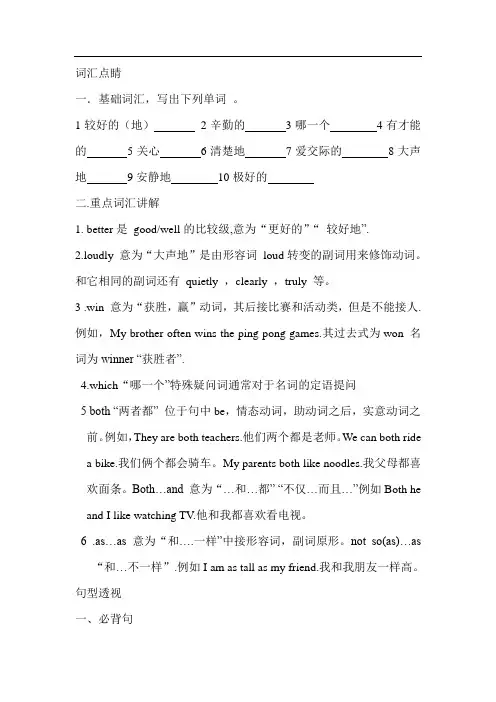
词汇点睛一.基础词汇,写出下列单词。
1较好的(地)2辛勤的3哪一个4有才能的5关心6清楚地7爱交际的8大声地9安静地10极好的二.重点词汇讲解1. better是good/well的比较级,意为“更好的”“较好地”.2.loudly 意为“大声地”是由形容词loud转变的副词用来修饰动词。
和它相同的副词还有quietly ,clearly ,truly 等。
3 .win 意为“获胜,赢”动词,其后接比赛和活动类,但是不能接人.例如,My brother often wins the ping pong games.其过去式为won 名词为winner “获胜者”.4.which“哪一个”特殊疑问词通常对于名词的定语提问5 both “两者都” 位于句中be,情态动词,助动词之后,实意动词之前。
例如,They are both teachers.他们两个都是老师。
We can both ride a bike.我们俩个都会骑车。
My parents both like noodles.我父母都喜欢面条。
Both…and 意为“…和…都” “不仅…而且…”例如Both he and I like watching TV.他和我都喜欢看电视。
6 .as…as意为“和….一样”中接形容词,副词原形。
not so(as)…as“和…不一样”.例如I am as tall as my friend.我和我朋友一样高。
句型透视一、必背句1.Tom比Sam更聪明吗? 不,Sam比Tom更聪明。
Is Tom Sam? No, he . Sam isthan Tom.2.Tara和Tina学习一样努力。
Tara works hard Tim.3.你的父亲和母亲谁更受欢迎?Who is , your father or your mother?二.例句解析1. Both Sam and Tom can play the drums , but Sam plays them better than Tom. Sam 和Tom 都会打鼓但是Sam比Tom 打得更好。
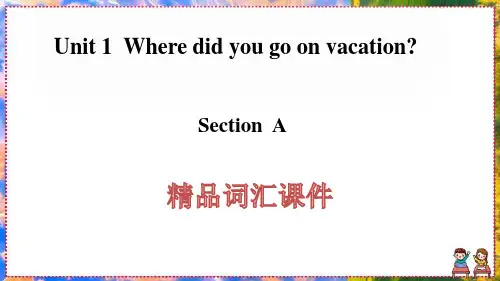
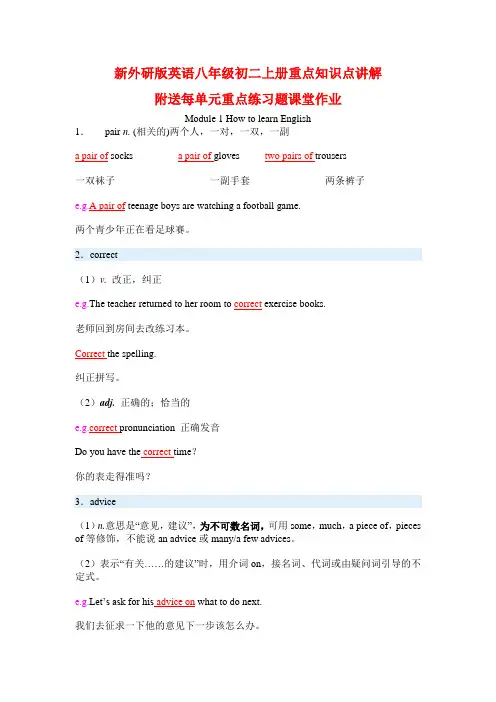
新外研版英语八年级初二上册重点知识点讲解附送每单元重点练习题课堂作业Module 1 How to learn English1.pair n. (相关的)两个人,一对,一双,一副a pair of socks a pair of gloves two pairs of trousers一双袜子一副手套两条裤子e.g.A pair of teenage boys are watching a football game.两个青少年正在看足球赛。
2.correct(1)v. 改正,纠正e.g.The teacher returned to her room to correct exercise books.老师回到房间去改练习本。
Correct the spelling.纠正拼写。
(2)adj.正确的;恰当的e.g.correct pronunciation 正确发音Do you have the correct time?你的表走得准吗?3.advice(1)n.意思是“意见,建议”,为不可数名词,可用some,much,a piece of,pieces of等修饰,不能说an advice或many/a few advices。
(2)表示“有关……的建议”时,用介词on,接名词、代词或由疑问词引导的不定式。
e.g.Let’s ask for his advice on what to do next.我们去征求一下他的意见下一步该怎么办。
常见搭配:take/follow one’s advice接受某人的建议ask for advice 征求意见accept/refuse one’s advice接受(拒绝)某人的建议offer advice to sb. 向某人提供建议拓展:advise vt.建议常见搭配:advise sb. to do sth.advise that sb. (should) do sth.e.g.My teacher advises me to leave now.老师建议我现在就离开。
Unit5 Do you want to watch a game show?sitcom ['sɪtkɒm] n.(=situation comedy) 情景喜剧news [nju:z] n.新闻节目;新闻U.一条消息:a piece of news;几条消息:some news;What good news it is!三个消息:“information、news和message”soap opera 肥皂剧mind [maɪnd] ①v.介意;对(某事)烦恼;后只接doing;①n. 头脑;心智Do/Would you mind opening the window? Do/Would you mind my/me opening the window?不介意:No, not at all. Of course not./Certainly not.介意:You’d better not.stand [stænd] v.[-stood]①忍受;后只接doing;I can’t stand waiting so long. ①站立educational [ˌedʒu'keɪʃənl] adj.教育的;有教育意义的an educational movieeducate v.教育;education n.教育educated adj.有教养的;受过良好教育的plan [plæn] v.n. 打算;计划①过去式pla nn ed-pla nn ing①作v. 后只接to do;plan to do sth计划做某事①n. make a plan to do sth计划做某事①n. make a plan for sth.hope [həʊp] v.n 希望该词只有两个用法①hope to do sth (hope后只接不定式)①hope后加that引导的宾语从句。
八年级上册英语单词重点及语法在八年级上册的英语学习中,有一些单词是比较重要且常用的。
下面是对这些单词的详细介绍以及相关的语法知识。
1. ambition (n.) 野心,抱负例句:My ambition is to become a successful lawyer.语法:形容词修饰名词的用法。
2. ancient (adj.) 古代的例句:The Great Wall of China is an ancient structure.语法:表达时间和年龄的形容词。
3. atmosphere (n.) 大气层,氛围例句:There is a friendly atmosphere in our school.语法:名词的复数形式。
4. benefit (n.) 好处,利益例句:Regular exercise has many benefits for our health.语法:名词的复数形式。
5. civilization (n.) 文明例句:Egypt was one of the earliest civilizations in the world.语法:连词的用法。
6. confident (adj.) 自信的例句:I am confident that I can pass the exam.语法:动词的不定式。
7. curiosity (n.) 好奇心例句:Children have a natural curiosity about the world.语法:形容词和副词的比较级。
8. environment (n.) 环境例句:We should protect our environment from pollution.语法:形容词修饰名词的用法。
9. evidence (n.) 证据例句:The police found some evidence at the crime scene.语法:that引导的宾语从句。
八年级上册英语m1m2单词外研版一、导言八年级上册英语m1m2单词是外研版英语教材中的重点内容,掌握这些单词对于学生的英语学习至关重要。
本文将对八年级上册英语m1m2单词进行详细介绍,以帮助学生更好地学习和掌握这些单词。
二、m1单词1. apple单词释义:苹果例句:I want to eat an apple.中文翻译:我想吃一个苹果。
2. banana单词释义:香蕉例句:She likes to eat bananas.中文翻译:她喜欢吃香蕉。
3. carrot单词释义:胡萝卜例句:Carrots are good for your eyes.中文翻译:胡萝卜对你眼睛好。
4. dog单词释义:狗例句:She has a pet dog.中文翻译:她养了一只宠物狗。
5. elephant单词释义:大象例句:The elephant is the largest land animal.中文翻译:大象是最大的陆地动物。
6. fish单词释义:鱼例句:I like to eat fish.中文翻译:我喜欢吃鱼。
7. grape单词释义:葡萄例句:I bought some grapes at the market.中文翻译:我在市场上买了一些葡萄。
8. hat单词释义:帽子例句:She wears a hat to keep the sun out of her eyes.中文翻译:她戴着帽子挡住阳光。
9. ice cream单词释义:冰淇淋例句:I like to eat vanilla ice cream.中文翻译:我喜欢吃香草冰淇淋。
10. juice单词释义:果汁例句:I drink orange juice every morning.中文翻译:我每天早上喝橙汁。
以上是八年级上册英语m1单词的详细介绍,希望学生能够通过反复练习和记忆,掌握这些单词的用法和意义。
三、m2单词1. kite单词释义:风筝例句:We flew a kite in the park.中文翻译:我们在公园里放风筝。
八年级上册英语第三单元单词讲解一、Introduction在八年级上册英语课程中,第三单元的学习内容涵盖了大量的单词。
熟练掌握这些单词对于学生来说至关重要,因为它们是建立起英语语言基础的重要组成部分。
通过本文,我们将对这些单词进行详细的解释和讲解,帮助学生更好地掌握这些单词的用法和意义。
二、Unit 3 Words1. arrange意义:安排,整理例句:We need to arrange the ch本人rs in a circle for the meeting.2. behavior意义:行为,举止例句:His behavior in class is always polite and respectful.3. citizen意义:公民例句:As a citizen of this country, we have the responsibilityto obey the law.4. decision意义:决定例句:Making a decision is not always easy, but we need to consider the consequences.5. educate意义:教育,培养例句:It is important to educate children about the importance of protecting the environment.6. f本人lure意义:失败例句:F本人lure is the stepping stone to success, so we should not be afr本人d to try.7. govern意义:治理,统治例句:The elected officials are responsible for governing the country and making important decisions.8. harsh意义:严厉的,刺耳的例句:The harsh punishment for breaking the rules surprisedeveryone.9. increase意义:增加,增长例句:The price of the product will increase next month due to high demand.10. issue意义:问题,议题例句:Thepany needs to address the issue of workplace safety.11. justice意义:正义,公正例句:The court system is responsible for ensuring justice for all citizens.12. knowledge意义:知识例句:Reading books is a great way to g本人n knowledge on different subjects.13. leisure意义:闲暇时间例句:During his leisure time, he enjoys playing sports and watching movies.14. manner意义:方式,态度例句:She always speaks in a polite manner to others.15. natural意义:自然的,天然的例句:The national park is known for its beautiful natural scenery.16. observe意义:观察,遵守例句:It is important to observe the rules and regulations in a public place.17. particular意义:特定的,特别的例句:She has a particular interest in learning about different cultures.18. quality意义:质量,品质例句:The restaurant is known for its high quality food and excellent service.19. realize意义:意识到,认识到例句:After the accident, he realized the importance of wearing a seatbelt.20. skill意义:技能,技巧例句:Learning a new language requires time and skill.21. translate意义:翻译例句:She is able to translate the document from English to Spanish.三、Conclusion通过对八年级上册英语第三单元单词的讲解,希望能够帮助学生更深入地理解和掌握这些单词的用法和意义。
Unit 3(比较级的使用,both的用法,描述性格的单词)1.WordsOutgoing both better loudly quietly hard-working competition fantastic which clearly win though talented truly care laugh serious mirror kid grade should saying reach hand touch heart fact break arm share loud similar primary information重点讲解:1)both 两个都一般和of连用Eg:Both of pens are mine.两支钢笔都是我的。
2)hard-working adj.工作努力的,辛勤的Eg:I admire their hard-working spirit.我钦佩他们的辛勤工作的精神。
3)Which 哪一个Which class are you in?你在哪个班?Which one is yours?哪个是你的?4)Serious adj严肃的,稳重的Eg:Ian is a serious guy.伊恩是一个认真的人。
(伊恩是一个稳重的人)This is a serious decision.这是个严肃的决定。
<拓>adv seriously 认真地,严肃地Eg:Let’s talk about it seriously. 让我们认真的来谈一谈。
(让我们严肃认真的来聊聊)5)Truly adv 真正,确实Eg:He truly loved his children.他由衷地爱他的孩子们。
<拓>典型地Eg:Spain was truly a European nation.西班牙是个典型的欧洲国家。
6)Necessary adj. 必要的,必须的Eg: s that really necessary?那真有必要吗?It is necessary that buy some papers when we are in art class.当我们上艺术课的时候买些纸是很必要的。
【温故】
taste
taste作连系动词,意为“尝起来”,其后常接形容词构成系表结构。如:
The cake tastes nice.
【运用】完成句子,每空一词。
我喜欢中国菜,因为中国菜味道好。
I like Chinese food, because it ________ ________.
(2013 山东淄博)
【知新】
1. seem
seem作动词,意为“好像;似乎;看来”,常用于以下结构:
◆seem (+ to be) +形容词 / 名词(短语)等如:
She seems (to be) right.
He seems (to be) a nice man.
◆seem to do sth. 如:
He seems to know everything about it.
◆It seems that ... 如:
It seems that he was late for the train.
【运用】完成句子,每空一词。
(1) 你好像挺高兴。
You ________ ________.
(2) 我好像听到那边有说话声。
I ________ ________ ________ voices over there.
(3) 看来,他们知道自己在干什么。
________ ________ ________ they know what they're doing.
2. try
try作动词,意为“尝试;设法;努力”,常用于以下结构:
◆try to do sth. 表示“设法做某事”。如:
David is trying to improve his health.
◆try doing sth. 表示“试着做某事”。如:
John isn't here. Try phoning his home number.
【运用】完成句子,每空一词。
(1) 你应该尽量多吃些水果。
You should ________ ________ ________ more fruit.
(2) 我试着跟比尔谈论这件事,但他不愿意听。
I ________ ________ ________ it with Bill, but he wouldn't listen.
答案
【温故】tastes / is; delicious / good
【知新】 1. (1) seem happy (2) seem to hear (3) It seems that
2. (1) try to eat (2) tried talking about